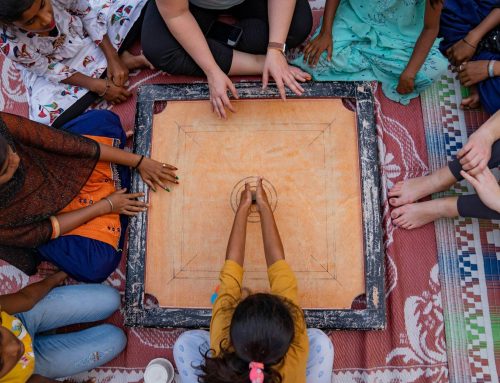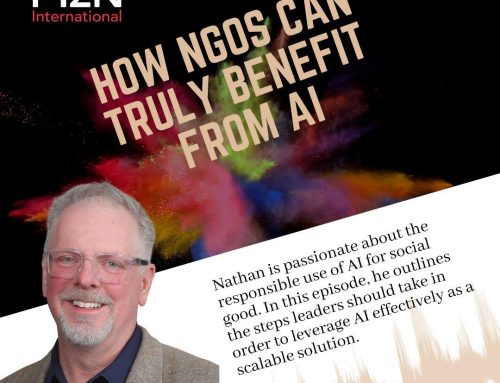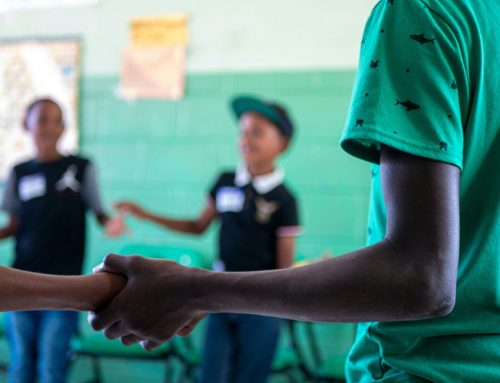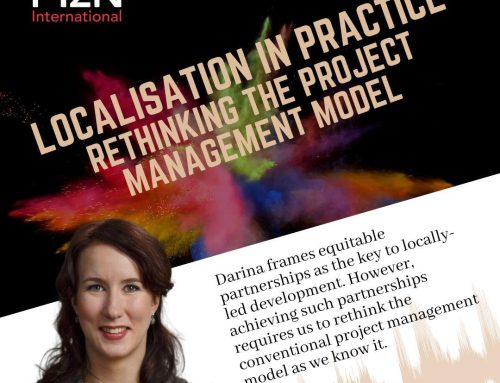MzN senior consultant Carolin Gomulia interviews Ingrid Srinath about changes NGOs should look out for in 2022
As we are slowly recovering from, and learning to live with, the Covid-19 pandemic, in March 2022, the world has once again been hit by a shocking, but maybe foreseeable, crisis – a war on the European continent between Russia and Ukraine.
The past years have been a clear indication that we are living in times in which predictability is becoming a notion of the past while unforeseen disasters are becoming the norm. In this global environment, NGOs continue to play a vital role for long-term sustainable development interventions but also immediate humanitarian aid interventions. Yet many of them are affected by the shifting funding landscape, including dwindling funding opportunities and changes in how funding is allocated and distributed.
Carolin Gomulia, senior consultant at MzN International, asked Ingrid Srinath, Founder and Director at the Centre for Social Impact and Philanthropy (CSIP) at Ashoka University in India, how NGOs can prepare for the changes that might lie ahead.
Thank you for agreeing to the interview with MzN. If you look at the current global politics, what would you say are the three most important changes for NGOs to prepare for in 2022?
Ingrid: Thank you for inviting me. I believe that continuing economic, social, ecological and psychological distress of increasing intensity among the communities we serve, recalibration of philanthropic priorities, and closing civil society space are the three most critical changes NGOs need to prepare for.
If we look at these three points more in-depth, what would you say is particularly important in terms of funding for NGOs? Are there any trends or innovations that NGO leaders should be aware of?
Ingrid: At CSIP, we have found that there are a few characteristics that differentiate NGOs who have coped relatively well with the volatility of the past few years. First, they have deep roots in the communities they serve which allows them to rapidly assess changing needs and to communicate these to donors and media authentically. Second, they have flexible, long-term funding commitments from their donors that permit them to respond to changing needs and to ensure stability and continuity of their staffing and programmes. Finally, these NGOs have better adopted and adapted technology to maintain and even grow their operations through the crises.
Some lessons to take away for fundraisers are:
- The need to build a diversified portfolio of fundraising channels and donor types to better insulate incomes from volatility.
- The value of strong relationships with ‘anchor’ donors whose support is not driven by changing trends, in particular, donors who are deeply committed to your mission and see themselves as true partners in its accomplishment. In India, these have tended to be high-net-worth Individuals and international foundations rather than businesses.
- The criticality of online modes of fundraising and communication from crowdfunding and online events to tapping into the surge in mutual aid.
Can you share an example of an organisation or project that adapted successfully to the constantly changing environment?
Ingrid: While there are many good examples, two that stand out for me are Jan Sahas – an NGO that serves migrant workers across India, and Jai Vakeel, an organisation that works with children with intellectual and developmental disabilities in Mumbai.
Jan Sahas drew on the signals from their migrant workers’ helpline to rapidly gather authentic data which they quickly turned into compelling communication to donors and the media. This helped make the issue the most salient one and allowed Jan Sahas to grow its fundraising, its impact, and its influence with government to change policies even as they responded to urgent needs for food, transport, information, PPE and livelihood support confronting their community.
Jai Vakeel not only provided their 700 students and their staff the immediate relief they needed when the pandemic struck but was also able to develop effective ways to engage students and their families through online modes. This was amplified through a partnership with the government to develop a curriculum that reached 13000 children and 1590 teachers across 275 schools across the state of Maharashtra in western India.
In closing, what would you say are the most crucial things for NGO leaders to navigate change in general and in the funding environment?
Ingrid: For me, the biggest lesson of the pandemic has been the value of prioritising the health, safety, and well-being of our teams. The scale and intensity of burnout we are witnessing across the sector, especially among NGO leaders, is massive, and our capacity to address it is minimal. We need to build support structures within our organisations, and collectively as a sector, to ensure we can protect our people so that they can, in turn, serve our constituents to the best of their capacities.
Another trend to which I think we should pay heed is the potential for new allies and innovation. These include:
- e-commerce platforms like Amazon, Uber and their local equivalents being re-purposed for aid delivery,
- diaspora communities providing international policy advocacy, not just financial support,
- partnerships with government forged during the crisis being leveraged towards longer-term, systemic change.
- New avenues, from digital currencies to hybrid organisational forms combining the advantages of nonprofits and social enterprises, need focused attention at a sector level.
Most importantly, however, the pandemic has opened possibilities for deep, structural change across a range of domains including public health, education, social protection, urban development and more. Building and strengthening our alliances and coalitions to seize these opportunities and to protect civil society from the growing threats to its independence and viability must be our most urgent priority as a sector.
Thank you very much for your insights. We highly appreciate your time and effort.
_______________________________________________________
Ingrid Srinath bio
Ingrid Srinath is the Director of the Centre for Social Impact and Philanthropy at Ashoka University. She has been a passionate advocate for human rights, social justice and civil society for the past 19 years. A graduate of the Indian Institute of Management, Kolkata, Ingrid transitioned from her 12-year career in advertising to the nonprofit sector in 1998 with CRY (Child Rights and You), where she was CEO from 2004-08.
She served as Secretary General from 2008-12 at CIVICUS: World Alliance for Citizen Participation, an influential global network of nonprofit organisations. She was Executive Director of CHILDLINE India Foundation, India’s emergency helpline for children in distress and, most recently, CEO of Hivos India, the Indian arm of the Dutch global NGO. She has served on the advisory boards of the United Nations Development Programme (UNDP), the United Nations Development Cooperation Forum (UN DCF), the World Economic Forum (WEF), the Young Lives project at Oxford University, Alliance magazine, Hasirudala, Danamojo and the Prajnya Trust and on the boards of WINGS, the INGO Accountability Charter, The Rules, Public Interest Registry and Majlis Law.






